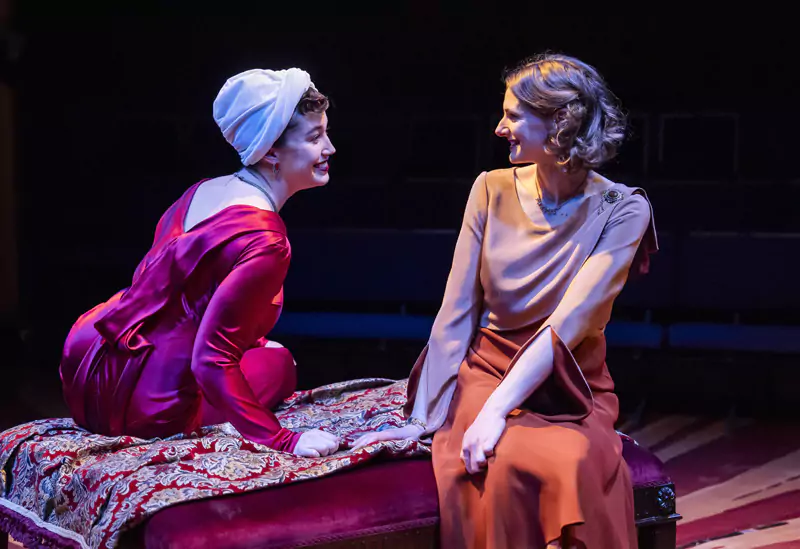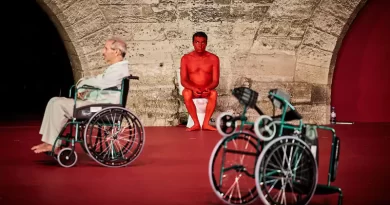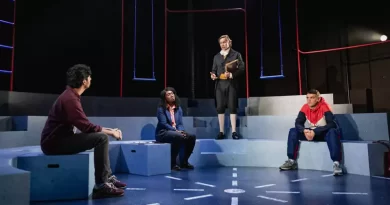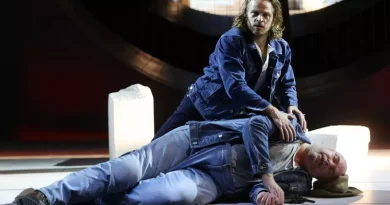“Churchill in Moscow” at Orange Tree Theatre
Simon Jenner in West London
13 February 2025
August 1942. “I feel I bring a lump of ice to the North Pole.” “He thinks I’m made of ice?” However the translators spin it, Churchill’s metaphors are lost on Stalin, and coals to Newcastle is a heroic compromise when two leaders need to talk in black and white. Howard Brenton’s new play Churchill in Moscow directed by Tom Littler runs at the Orange Tree Theatre until 8 March.

Jo Herbert and Elisabeth Snegir.
Photo credit: Tristram Kenton.
This, with Roger Allam in the title role, is the sixth production Littler and Brenton have collaborated in: it shows. There’s a nod to their last at Jermyn Street Theatre, Cancelling Socrates in 2022, when that philosopher is referenced and knowing laughter ripples out. In an exceptionally crisp production bringing some of the same team who worked in Jermyn Street, Brenton couldn’t be in better hands. It helps that it’s Brenton’s best play for a while too.
Stalin wants a second front. In four scenes alternating between amicable and ferociously hostile, two men have to come to a personal understanding or Hitler will triumph. Each thinks the other’s about to surrender and hating Hitler for not identical reasons is their only bond. And a capacity for hard drinking.
That lump of ice is Churchill having to tell Stalin the Allies can’t invade northern France till next year at the earliest. Brenton doesn’t mention the (in fact catastrophic) Dieppe Raid less than a week later will confirm Churchill’s opinion in how difficult it would be. Churchill has form with disastrous amphibious assaults as his own ambassador fearlessly points out (the notorious Gallipoli campaign in the First World War). And Churchill himself refers to the disastrous PQ17 convoy to Murmansk nearly obliterated by U-boats.
Allam triumphs in a performance accenting Winston Churchill without parody. There’s little harrumphing and Brenton’s language is too keen to allow a “moreover” to drawl out. But Allam semaphores Churchill’s stature with gleaming turns and flashes of wit. Peter Forbes embodies Joseph Stalin alarmingly well. Full of his imagined burl and strut, and occasional boggle. Neither man has stumbled against a “no” or “niet” of stature before: here both of them size up the hopeful monster in each other.

Peter Forbes and Tamara Greatrex.
Photo credit: Tristram Kenton.
Churchill’s translator Sally Powell (Jo Herbert) talks of Stalin’s Georgian sounding West Country to Muscovites. Ones like Vyacheslav Molotov (Julius D’Silva), originator with the Nazi foreign minister Ribbentrop of the Soviet/German Pact of 1939 (as Allam points out, his Churchill flaring up). Molotov has less to do and is underwritten.
Churchill’s aristocratic lineage (General Marlborough is referenced by Stalin) means both men are outsiders to their power base. Brenton doesn’t hesitate to disabuse anyone who thinks only one of them has perpetrated genocide. Equivalence is a statistics game; the 1943 Bengal famine looms.
Churchill’s only interlocutor is Ambassador Archie Clark Kerr (Alan Cox) who finds it comically difficult to keep up with drinking. It’s the one scene where D’Silva shines with equivocation and occasional truth. There’s much pairing-off elsewhere and Cox, who revels in Kerr’s mix of diplomatic anxiety and truth-to-power steeliness, is given several such moments: he’s determined there’ll be a deal, he tells Sally.
This is where Brenton’s play loosens further from damn lies and statistics. Though what transpires between the leaders is also speculation, it’s where Herbert’s Sally bonds with her opposite number Olga Dovzhenko (Elisabeth Snegir), apparently a deep Siberian forester in peacetime. Their respective ranks though reveal other depths and their rapport is the most imaginative, exuberant part of the play. Indeed they’re about to race-off to a bar when history strikes. Powell’s role is the freer and more expressive, but Snegir delights in ripostes and their mutuality emerges in continual duetting: “I love Russian, it’s so deep.” “I love English … it’s all over the place.”
Either way, their roles become crucial, collusive, deep, and necessarily all over the place. It’s a thrilling moment of high drama. And Brenton caps this when in its wake the leaders banish their translators and explode amiably – Julia Cave’s movement direction here a polka dance for polar bears.
Brenton further deflects from a potential bearhug of a bromance, introducing “little hostess” Svetlana Stalin (Tamara Greatrex), padding on with David Copperfield – given an inscription by Allam. It’s promising and Greatrex reveals a brave, still innocent but visibly growing-up girl of 16 coming to terms with who her father is, what he means. But the Copperfield motif whilst accurate doesn’t land: Svetlana is unmeridianed from the action, and unpaired. There might have been interaction with Sally, but Olga stamps on it out of fear, fruitlessly denying who Svetlana is. Brenton realizes his character’s gone peregrine, and Greatrex delivers a stunning apotheosis at the end. She furnishes more than an epilogue in a set of prophesies of what Svetalana’s extraordinary life will be, and the fate of empires. It’s not quite enough to redeem the role, but Greatrex is radiant.
The Orange Tree pulses with memorable tight production values to match the acting. Designer Cat Fuller’s props and a rising-sun motif is painted on the floor (echoing Stalin’s palace), some singular props appearing in its radial centre. Johanna Town’s lighting and scene titles in Russian and English, projected briefly on the balconies, meld with Max Pappenheim’s striking sound with deep crumps; capped by a blare of Walton’s Crown Imperial and (Pappenheim’s) Soviet marches.
Brenton’s fine play glints with imaginative sallies, produces a fearful symmetry of leaders, and lets history down with two and a half cheers. Though one could wish for Molotov and particularly Svetlana to justify their presence (though certainly not the actors), Churchill in Moscow is necessary and its production definitive.









